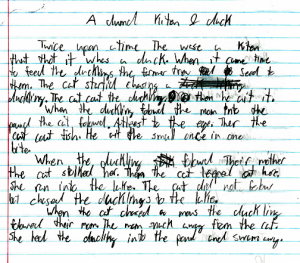Thirsty for a Strong Instructional Practice?
Have you ever read a student’s in-class writing assignment that looks something like this…?

The student who wrote this clearly struggles with spelling and handwriting, and at first glance, it is tempting to assume that this is a poor student. However, it is likely that the student who wrote this has a learning disability called dyslexia, More so, it is highly likely that the student who wrote this has a variety of strengths that far exceed those of their peers. This student’s ability to use their strengths is critical to their learning. How can we as college instructors make sure the strengths of students with Dyslexia are recognized and nurtured?
Take a SIP of This: Strengths of Students with Dyslexia
Dyslexia is a language-based learning disability that is neurobiological in origin and impacts a person’s ability to sound out words and spell. People with dyslexia may also have poor handwriting, struggle to pay attention, or lose energy by the end of class. As with all neuro-diversities, dyslexia impacts some people more than others. Approximately 15-20% of the US population has a language-based learning disability such as dyslexia. The IQ scores of people with dyslexia and those without are roughly equivalent.
Dyslexics’ strengths come from two sources. First, differences in brain function that make language processing more difficult are often paired with differences in brain function that make other tasks easier. Second, students with dyslexia typically face situational challenges that build strengths. Here are a few common strengths of people with dyslexia.
- Creative Thinking. When one method for reading a word doesn’t work, the student with dyslexia has to find another. Students with dyslexia are well suited to finding alternatives and problem solving.
- Visual-Spatial Thinking. People with dyslexia are often strong at thinking in pictures. Strengths in the mental manipulation of objects can help with building and mechanics. Visual imagery is a great tool to use for memorization and story building.
- Perseverance. People with dyslexia must work harder than typical readers. Sounding out words, particularly those that are used out of regular context, those that are used infrequently, or those with atypical spellings requires additional effort. Over the course of the day the extra effort results in fatigue and stress. Our students with dyslexia continue their education at MSU Denver despite the fact that it can feel like a constant uphill battle.
- Resilience. Many students with dyslexia have been told that they are stupid. Peers, siblings, tests, and even teachers are guilty of this. Many spent years in “special” classes for remediation of their reading disability, separate from friends and the “normal” kids. These experience often result in feelings of shame and embarrassment but college students with dyslexia either rejected those experiences or used them to propel forward.
How can the strengths of a student with dyslexia contribute to a productive learning context?
- Take a break after teaching a challenging concept or process. Have students illustrate the concept or draw a diagram of the process. Then, give students the opportunity to explain their illustration or drawing to a partner or small group. It is likely that the drawing of the student with dyslexia, along with the student’s explanation of their drawing, will increase their classmates’ understanding of the content.
- Present a problem for the class to solve. Give students time to think about various possibilities before they share. Frequently, the ideas presented by your students with dyslexia will be creative and effective. This type of “out of the box” thinking can benefit students whose ideas are more traditional.
- The content we teach often includes ideas about failure or defeat and the achievements that emerged from them. The challenges our students with dyslexia faced growing up can allow them to understand the benefit of challenge, and how much of what seeks to hold us back, in fact, pushes us to move forward. Prompt students to think about and discuss the benefits of failure or defeat. Many students who have not faced significant learning challenges will benefit from understanding how setbacks can be used productively.
- When appropriate, permit students to express what they’ve learned in ways other than writing, such as illustrations, videos, music, etc.
Still Thirsty? Take Another SIP of Strengths of Students with Dyslexia
- Dyslexic Advantage is an organization dedicated to focusing on the strengths of people with dyslexia. The authors of the website, Drs. Brock and Fernette Eide, also have a book titled, “The Dyslexic Advantage: Unlocking the Hidden Potential of the Dyslexic Brain”
- Do you ever wonder whether you have dyslexia? Try taking Dyslexic Advantage’s validated Dyslexia Test or the International Dyslexia Association’s Self-Assessment Tool.
- Interested in hearing about people’s experiences with dyslexia and other neuro-diversities? Head to Understood.org to read personal stories.

1 comments
The student always looking to get help from example written work previously by any student!